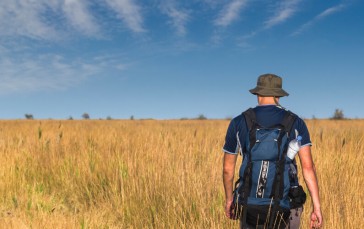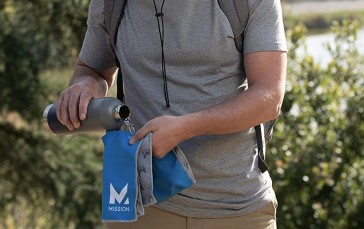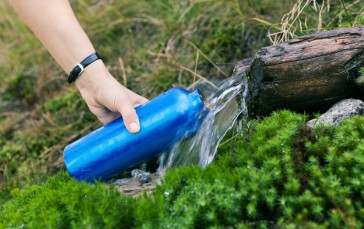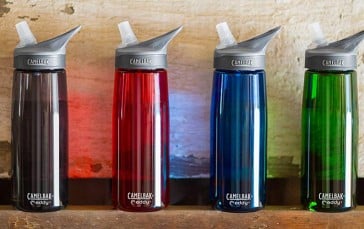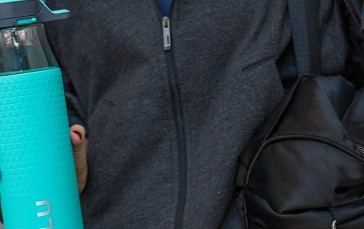Tips To Handle Heat Exhaustion
If you’ve ever fallen victim to the woes of heat exhaustion you know how debilitating it can be. Heat exhaustion often overwhelms the sufferer quite suddenly, but sometimes it can take a little time to make its presence felt. It is usually the result of working or playing too hard in hot conditions. It can also come about from being confined in a hot space like a car on a hot summer day or consuming too much alcohol out in the sun. Most of the time dehydration is the main trigger of the problem with the symptoms varying from excessive sweating to a feeling of extreme fatigue, nausea, cramping muscles, dizziness or fainting.
Heat exhaustion is a serious condition and it is relatively easy to treat in its early stages. However, if left untreated for too long it can develop into heat stroke which can be life-threatening. The earlier heat exhaustion is detected and handled, the sooner you can begin recovery. There are a number of ways to handle heat exhaustion as long as you act fast.

Understand the Warning Signs
If you’ve been out in the hot sun all day and suddenly feel ill, you may be experiencing the first symptoms of heat exhaustion. If you suddenly feel fatigued or it has become difficult to breathe, stop what you are doing and get out of the sun. Similarly, if you’re experiencing muscle cramps or your heart is pounding rapidly, you need to stop what you are doing and try and cool down. These are some of the earlier signs of heat exhaustion and the best thing you can do for yourself is to try to cool yourself down. Other symptoms include nausea and vomiting, a sense of feeling confused, pale clammy skin and feeling as though you are about to faint. In many cases, sufferers do pass out and need immediate medical attention.
How to Treat Heat Exhaustion
The first thing you need to do if you are suffering from a bout of heat exhaustion is to get out of the sun. If heat exhaustion is the result of being in a hot enclosed space like a small room or car, get out into the fresh air, preferably in a shady spot.
Your next course of action is to drink plenty of fluids. A contributing factor to heat exhaustion is dehydration. Sufferers of heat exhaustion often sweat profusely, causing a loss of fluids. If these fluids are not replaced, electrolytes are lost and dehydration sets in. The best fluids to take in this case are sports drinks as they have these precious electrolytes and will help you recover quite quickly. Have a drink every 10 to 15 minutes until you start to feel better and then drink as needed. While sports drinks are your best solution, any fluids will help to alleviate the symptoms. However, steer clear of caffeinated drinks and alcohol as these can make matters worse.
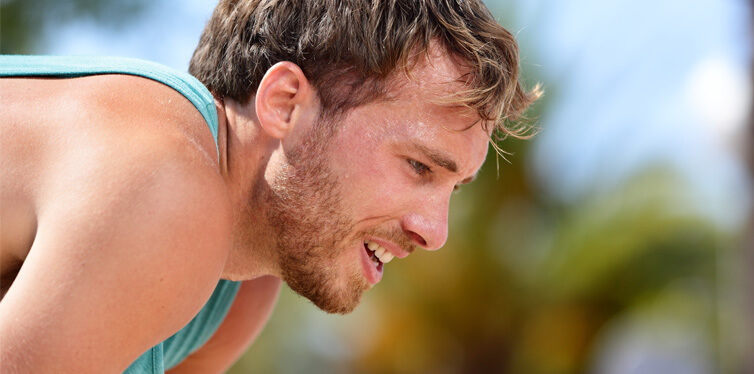
You should also remove as many layers of clothing as you can. Tight clothing is constrictive and should be removed as soon as possible so that as much of your skin you can decently show is exposed to cooling air. If you can get to a space with an AC unit, or in front of a cooling fan or cooling tower fan, all the better. There are now portable air conditioners, so you can take that into consideration as well.
A cold shower or a sponge bath are also great ways to cool down. If you’re near a body of water or a swimming pool, get your feet in fast. The water will cool your circulating blood at your feet and send it back up through your veins at a lower temperature which will cool you down quite considerably. Don’t jump into the water as this sudden change in temperature can induce severe cramps in your muscles or even cause a seizure. In some cases, the shock of immersing a hot body in cold water can cause cardiac arrest. Cooling down is important but you don’t want to do it too rapidly.
When to Seek Medical Attention
If you catch the symptoms of heat exhaustion in the earlier stages and you take the correct measures to cool down, you should notice an easing of the symptoms within 15 to 30 minutes. If the symptoms persist longer, you should seek medical attention as soon as possible.
If the sufferer loses consciousness or seems to be hallucinating, get them to the emergency room. The same applies if the sufferer is vomiting or if they have a seizure. If you find yourself in this situation, let the people around you know that you need help. If you are alone, call your local emergency number and seek immediate assistance. If you notice these symptoms in a person, get them to help fast.
Even milder cases of heat exhaustion can develop into life-threatening ones so if you have been affected you should get yourself checked by a doctor. In any case, you should avoid exposure to the sun for a minimum of 24 hours after suffering an episode of heat exhaustion.

Prevention Is Always Better Than Cure
On very hot days it’s best to limit your exposure to the sun and any strenuous activity. However, sometimes we can’t avoid being out and about on a hot day. If you’re an athlete competing in a competition, or a worker who has no choice but to be on the job you can’t avoid getting hot, but you can minimize the chances of suffering from heat exhaustion. Wear light, breathable clothing and absolutely don’t go outside without a hat. Most importantly, eat light food such as fruit and salads when you take a break and stay hydrated. Rest as often as you can and get out of the sun as soon as you’re able to. Most importantly, if you do start to feel ill. Stop what you’re doing. Nothing is more important than your health and if you handle heat exhaustion before it really hits you the nasty symptoms can be prevented, as well as a trip to the emergency room.
Whatever you do, listen to the signals your body is sending you and stop heat exhaustion before it starts.



